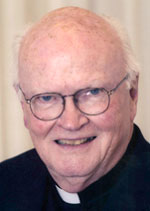“Barbarism,” wrote the great Jesuit intellectual Father John Courtney Murray more than 50 years ago, “is the lack of reasonable conversation according to reasonable laws.”
I often think of that as I observe gridlock in the U.S. Congress today and the absence of reasoned argument in so many other areas of contemporary life. I hesitate to call what I observe barbaric, but it does give me pause.
Father Murray was fond of quoting Dominican philosopher/theologian Father Thomas Gilby’s observation that “civilization is formed by men [he would surely include women today] locked together in argument. From this dialogue the community becomes a political community.”
The absence of true political community in our cities, states and nation, not to mention the wider world, is beyond regrettable. The only remedy capable of meeting this need is reasoned argument and the best place for cultivating reasoned argument is the schools, especially those at the higher level that promote and protect the liberal arts.
Families as well as elementary and secondary schools have much to contribute to the cultivation of reasonable conversation, but that won’t happen unless we listen and speak to one another in some orderly fashion.
[hotblock]
We need reasonable conversation within the context of reasonable laws, of course, but unless gridlock, prejudice and ignorance yield to reasoned argument, progress on the legislative front simply will not happen.
Where is reason when we need it? It is locked in closed minds that need to begin thinking in orderly fashion. Leadership is needed on many fronts in order to release the results of orderly thinking.
Elected officials must let us hear it in their spoken remarks. Editors have to help us see it in print. Religious leaders have to preach it in word and action. Educators need to deliver it in new and more effective formats. Business leaders have to live it every day. Scientists and engineers have to discover it and put it in place in support of human progress.
Modern telecommunications could serve to inform local, regional, national and international communities if only interacting minds, locked in reasoned argument, can succeed in delivering well-reasoned conclusions.
In the book, “We Hold These Truths,” Father Murray asked: “If then society is civil when it is formed by men locked in argument, the question rises, what is the argument about?”
In response, he offers three major themes: The argument is about those things that are for the advantage of the public; the argument concerns the affairs that are, at least in part, beyond the scope of government, matters that bear upon the quality of common life; and the argument is about consensus, arrived at by the people, that reflects its “sense of purpose as a collectivity organized for action in history.”
The absence of consensus on so many critical issues today in America is a measure of how far we have to go in becoming the civilization we blithely believe ourselves to be.
—
Jesuit Father Byron is university professor of business and society at St. Joseph’s University, Philadelphia. Email: wbyron@sju.edu.
PREVIOUS: Reflect calmly on the news, not the next ‘crisis’
NEXT: The degeneration of words as weapons



Share this story